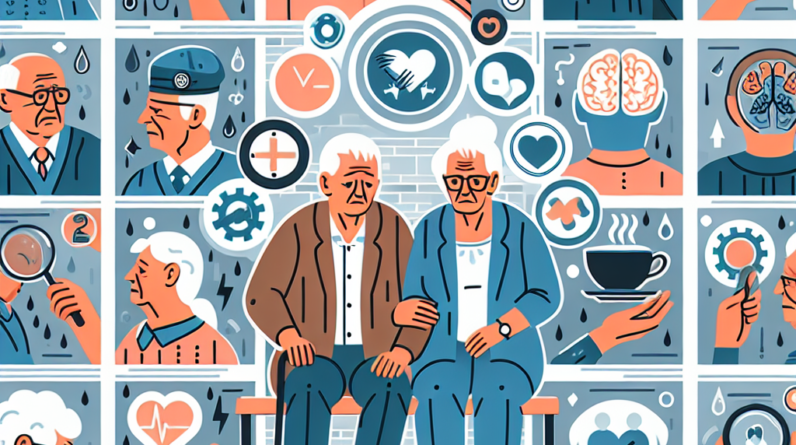
As we journey through life, it’s not uncommon to notice changes in our physical health as we grow older. Our bones may become weaker, our vision may blur slightly, and our joints may ache more than they used to. But have you ever stopped to ponder why our mental health often follows a similar path? The deterioration of mental health with age is a topic that has intrigued experts for years, as they seek to understand the underlying factors contributing to this phenomenon. In this article, we will explore the potential reasons behind the decline in mental well-being as we age and shed light on this intriguing aspect of the human experience. So, let’s embark on this journey of discovery together, shall we?

Biological Factors
Genetic predisposition
Genetic predisposition refers to the hereditary factors that can contribute to mental health deterioration with age. Research has shown that certain genetic variations can increase the risk of developing mental health disorders such as depression, anxiety, and dementia. These inherited traits, combined with other biological and environmental factors, can influence the onset and progression of mental health conditions in later life.
Neurological changes
As we age, our brain undergoes various physiological changes that can impact mental health. The brain’s structure and function gradually decline, leading to a decrease in cognitive abilities and an increased vulnerability to psychiatric disorders. Neurotransmitter imbalances, reduced neuroplasticity, and increased inflammation are also common factors associated with mental health deterioration in older adults.
Hormonal imbalances
Hormonal imbalances can significantly affect mental health in older adults, particularly for women during menopause. The decline in estrogen levels can contribute to mood swings, irritability, and an increased risk of developing depression or anxiety. Furthermore, changes in other hormone levels, such as cortisol and thyroid hormones, can also impact emotional well-being and cognitive function.
Psychological Factors
Cumulative stress and trauma
Throughout our lives, we encounter various stressful situations and traumatic events. The accumulation of these experiences over time can take a toll on mental health in later life. The resilience to cope with these stressors may decrease, and unresolved trauma from the past can resurface, leading to the development or exacerbation of mental health disorders.
Grief and loss
With age comes the loss of loved ones, whether it be friends, spouses, or family members. Grief can have a profound impact on mental health and can trigger conditions such as depression, anxiety, or complicated grief. The emotional pain and sense of loss associated with bereavement can be particularly challenging for older adults who may already be navigating other age-related changes.
Loneliness and social isolation
The prevalence of loneliness and social isolation among older adults is a significant concern for mental health. Aging is often accompanied by changes in social circles, such as retirement, empty nest syndrome, or the loss of friends and family members. The lack of social connections and meaningful relationships can lead to feelings of loneliness, depression, and anxiety.
Cognitive decline
Age-related cognitive decline, such as memory loss and difficulty concentrating, can contribute to mental health deterioration. Struggles with cognitive function can lead to frustration, loss of confidence, and even contribute to the development of mental health disorders. The fear and stigma associated with cognitive decline can further impact an individual’s emotional well-being.
Physical Health Conditions
Chronic illnesses
Chronic illnesses, such as heart disease, diabetes, or arthritis, can have an impact on mental health as individuals age. The burden of managing a chronic condition, physical limitations, and the potential for reduced independence can lead to feelings of depression, anxiety, and a decreased quality of life.
Side effects of medication
Many older adults take multiple medications to manage their health conditions. Some medications can have side effects that impact mental health, such as mood changes, sleep disturbances, or cognitive impairment. It is essential for healthcare providers to consider the potential psychological effects when prescribing medications for older adults.
Substance abuse
Substance abuse can be a concern for mental health in older adults. The misuse of alcohol, prescription drugs, or illicit substances can exacerbate symptoms of mental health disorders or contribute to the development of new ones. Substance abuse can also impair cognitive function, increase social isolation, and hinder one’s ability to manage their overall well-being.
Lifestyle Factors
Sedentary lifestyle
A sedentary lifestyle, characterized by low levels of physical activity, can have a negative impact on mental health as we age. Regular exercise has been shown to have numerous psychological benefits, including reducing symptoms of depression, anxiety, and stress. Engaging in regular physical activity can enhance mood, cognitive function, and overall well-being.
Poor nutrition
Nutrition plays a vital role in maintaining a healthy mind and body. As we age, our nutritional needs may change, and poor dietary choices can contribute to mental health deterioration. Nutrient deficiencies, such as deficiencies in omega-3 fatty acids and B vitamins, have been associated with an increased risk of mental health disorders. A balanced diet rich in fruits, vegetables, whole grains, and lean proteins can support optimal mental health.
Sleep disturbances
Sleep disturbances, including insomnia and sleep apnea, are common among older adults and can negatively impact mental health. Sleep plays a crucial role in emotional regulation, cognitive function, and overall well-being. Persistent sleep problems can lead to increased susceptibility to mental health disorders, such as depression and anxiety. Establishing good sleep hygiene practices and seeking treatment for sleep disorders is essential for maintaining mental well-being.

Societal Factors
Stigma and discrimination
Stigma and discrimination surrounding mental health can have a significant impact on older adults. The fear of judgment or being labeled as “crazy” can prevent seniors from seeking help or discussing their mental health concerns openly. The perpetuation of ageist stereotypes can also contribute to a lack of understanding and support for older adults struggling with their mental well-being.
Limited access to mental healthcare
Access to mental healthcare services can be limited for older adults, especially those living in rural areas or facing financial constraints. The shortage of geriatric mental health specialists and the complexity of navigating the healthcare system can make it challenging for older adults to receive timely and appropriate support. Improved accessibility and tailored mental healthcare services are crucial for addressing the mental health needs of aging populations.
Role of Caregiving
Increased stress and burden
Caregiving for a loved one can be emotionally and physically demanding, often leading to increased stress and burden. Caring for someone with a mental health disorder or cognitive decline can be particularly challenging and may impact the mental well-being of the caregiver. The stress of caregiving can contribute to depression, anxiety, and burnout.
Neglecting self-care
In the midst of caregiving responsibilities, caregivers often neglect their own self-care needs. The focus on the well-being of their loved ones can leave little time and energy for self-care activities, exacerbating stress and impacting mental health. It is crucial for caregivers to prioritize their own well-being and seek support to maintain their mental and emotional resilience.
Changes in Social Roles
Loss of work identity
Retirement often brings a significant change in one’s social roles and identities. The loss of a work identity, professional networks, and daily routine can contribute to feelings of loss, purposelessness, and a decline in mental well-being. Adjusting to a new phase of life and finding meaningful ways to engage and contribute can help mitigate the impact of this transition on mental health.
Empty nest syndrome
As children grow up and leave home, parents may experience empty nest syndrome, characterized by feelings of loss, sadness, and loneliness. The absence of a bustling household and the shift in responsibilities can leave parents feeling disconnected and purposeless. Building new relationships, pursuing personal interests, and finding new sources of joy and fulfillment are essential in navigating this transition and maintaining mental well-being.
Psychosocial Transitions
Retirement
Retirement is a significant life transition that can impact mental health. The sudden shift from a structured, work-based routine to increased leisure time and potential loss of identity can lead to feelings of uncertainty, boredom, and a sense of purposelessness. Planning for retirement, maintaining social connections, and exploring new activities can support a smooth transition and promote mental well-being.
Relocation
Relocating to a new community, whether due to retirement, downsizing, or other reasons, can be a challenging adjustment for older adults. Leaving familiar surroundings, social networks, and established routines can contribute to feelings of isolation, stress, and anxiety. Developing a support system, engaging in community activities, and maintaining communication with loved ones can ease the transition and promote mental health.
Death of spouse
The death of a spouse is a profound loss that can have a significant impact on mental health. The emotional pain, grief, and feelings of loneliness can contribute to the development of depression, anxiety, or complicated grief. Seeking support from family, friends, or therapists can provide the necessary resources to navigate the grieving process and promote mental well-being.
Coping Strategies
Positive coping mechanisms
Engaging in positive coping mechanisms is crucial for maintaining mental health in older age. Practices such as relaxation techniques, mindfulness, physical exercise, hobbies, and creative outlets can help manage stress, reduce symptoms of mental health disorders, and enhance emotional well-being. Exploring and implementing coping strategies that work best for each individual can lead to improved mental resilience and overall quality of life.
Therapeutic interventions
Therapeutic interventions, such as counseling, psychotherapy, or cognitive-behavioral therapy, can be highly beneficial for older adults facing mental health challenges. These interventions provide a safe and supportive environment to address underlying issues, develop coping skills, and foster personal growth. Collaborating with mental health professionals can assist in identifying effective therapeutic interventions tailored to individual needs.
Preventive Measures
Healthy lifestyle choices
Adopting and maintaining a healthy lifestyle can significantly contribute to mental health maintenance. Regular physical activity, a balanced diet, adequate sleep, and stress management techniques can all support emotional well-being as we age. Making mindful choices and prioritizing self-care can reduce the risk of developing mental health disorders and promote overall well-being.
Building social connections
Nurturing social connections is vital for mental health in older age. Seeking opportunities for social engagement, participating in community activities, and fostering meaningful relationships can combat loneliness, reduce the risk of depression and anxiety, and provide a strong support network. Actively investing in social interactions contributes to cognitive stimulation and emotional resilience.
Early intervention and treatment
Early intervention and treatment for mental health conditions are crucial for promoting positive outcomes. Recognizing the signs and symptoms of mental health issues, seeking professional help promptly, and following through with recommended treatment plans can prevent further deterioration of mental well-being. Regular check-ins with healthcare providers and proactively addressing mental health concerns can lead to better overall functioning and improved quality of life in older adults.
In conclusion, several factors contribute to the deterioration of mental health with age. Biological factors, psychological factors, physical health conditions, lifestyle factors, societal factors, changes in social roles, psychosocial transitions, role of caregiving, coping strategies, and preventive measures all play a role in determining an individual’s mental well-being in later life. Understanding these factors and implementing appropriate interventions and support systems are vital in promoting positive mental health outcomes for older adults. By addressing the unique needs and challenges that come with aging, society can work towards ensuring that individuals can age gracefully and maintain optimal mental well-being.







